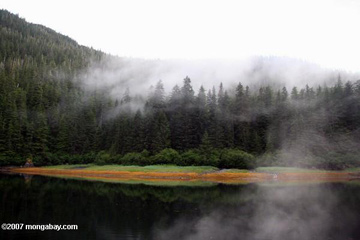Boreal forest fires important source of emissions
Boreal forest fires important source of emissions
mongabay.com
October 31, 2007
Forest fires in the boreal forests of Canada are an important source of greenhouse gas emissions reports a new study published in the journal Nature.
University of Wisconsin-Madison forest ecology professor Tom Gower, and colleagues write that fires trigger the release of large amounts of carbon dioxide through mechanisms in addition to burning. The loss of tree canopy following a fire can allow more sunlight to reach the forest floor, leading to increased decomposition and rates of carbon emissions. Warming can melt underlying permafrost, releasing even more stored carbon.

|
Gower adds that climate change is creating warmer and drier conditions conducive to forest fires.
“All it takes is a low snowpack year and a dry summer,” he said. “With a few lightning strikes, it’s a tinderbox.”
Gower and colleagues say their model suggests that boreal forests are becoming less effective as a carbon sink and that they could soon become a carbon source, contributing to climate change.
“The soil is the major source, the plants are the major sink, and how those two interplay over the life of a stand really determines whether the boreal forest is a sink or a source of carbon,” said Gower. “Based on our current understanding, fire was a more important driver (of the carbon balance) than climate was in the last 50 years. But if carbon dioxide concentration really doubles in the next 50 years and the temperature increases 4 to 8 degrees Celsius, all bets may be off.”
Related articles
Could global deforestation fight climate change?
(4/9/2007) While many climate change mitigation schemes rely on reforestation schemes to sequester carbon dioxide from the atmosphere, those located in temperate regions may actually be warming the planet, worsening global change, reports a new study published in the April 9-13 online edition of the Proceedings of the National Academy of Sciences. Surprisingly, the research suggests that global-scale deforestation would produce a net cooling effect, but that forest preservation efforts and reforestation in the tropics is more effective in cooling the planet.
Boreal forests worth $250 billion per year worldwide
(9/25/2006) Boreal forests provide services worth $250 billion per year globally according to estimates by Canadian researchers. Mark Anielski, an Edmonton economist, says that environmental services from the boreal — including carbon capture and storage, water filtration and waste treatment, biodiversity maintenance, and pest control — are worth about $160 per hectare, or $93 billion per year in Canada alone.














